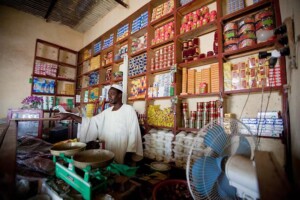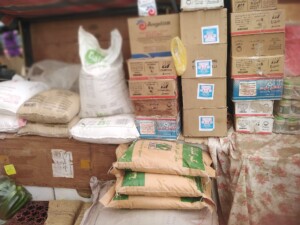Many Sudanese not able to buy a sheep for Eid El Adha
Many people in Sudan complain about a significant increase in the prices of basic commodities in Sudan. Traders report a weak demand for sheep, to be slaughtered during the Eid El Adha, amid a broad stagnation in the markets.
Both merchants and customers who are preparing for the Eid El Adha (the Muslim Feast of the Sacrifice) that will start this weekend fear that not many sheep will be traded this year.
 Sheep trade in eastern Sudan (UNFAO)
Sheep trade in eastern Sudan (UNFAO)
Many people in Sudan complain about a significant increase in the prices of basic commodities in Sudan. Traders report a weak demand for sheep, to be slaughtered during the Eid El Adha, amid a broad stagnation in the markets.
Both merchants and customers who are preparing for the Eid El Adha (the Muslim Feast of the Sacrifice) that will start this weekend fear that not many sheep will be traded this year.
Hajj Dawi told Radio Dabanga from Nyala, capital of South Darfur, that the prices of sheep at the city’s livestock market range between SDG45,000 and SDG125,000.
He predicted that prices are likely to decline due to the weak demand. “The turnout of buyers is currently much less than it was at this time in previous years.”
In El Fasher in North Darfur, the price of sheep ranges between SDG45,000 and SDG140,000. A goat is sold for about SDG65,000.
In Khartoum, the minimum price for a small sheep is about SDG60. An average-size sheep cost at least SDG75,000, while prices for large sheep range between SDG110,000 and SDG200,000.
According to the Central Bank of Sudan today, the official Dollar rate lies around SDG447, while the greenback traded for SDG563 at the parallel market in Khartoum yesterday.
The salary of a senior teacher is about SDG15,000 per month.
In an opinion poll on Radio Dabanga's Facebook page, in which more than 300 people participated, 78 percent of the respondents confirmed their inability to purchase a sheep. They blamed the government for the lack of control over market prices, including those of the livestock markets, and accused the traders of being “more than greedy”.
Traders themselves attributed the soaring livestock prices to the increased export prices. They pointed to “a complete stagnation in the sales due to the price discrepancy between last year and this year”.
Regarding plans announced by the authorities in Khartoum to fix the livestock prices based on the weight of the animals, all sources interviewed by Radio Dabanga confirmed that they had not heard of the project.
On July 1, Radio Dabanga reported that the poverty and food insecurity rates in Sudan are projected to increase further until September. Numbers are said to be significantly higher than those estimated by the United Nations which in March this year predicted a food crisis looming for 18 million Sudanese.
Earlier this year, Sudanese farmers warned for the failure of the current agricultural season, accusing the central government of neglecting them. “Farming now is like taking a leap in the dark,” Ahmed Babiker, Secretary-General of the El Gezira and El Managil Farmers Association said.











 and then
and then